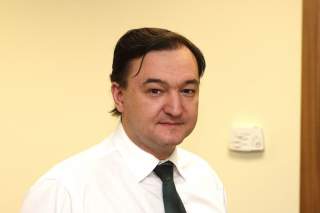A Response to William Browder
Browder might recall that in his former homeland freedom of the press remains a cherished value.
William Browder says that I “wrote an article in the National Interest entitled, ‘What Really Killed Sergei Magnitsky.’” This is not quite right. I wrote an article entitled, “What Really Killed Sergei Magnitsky?” In dropping the question mark, Browder commits a telling error. Throughout his response, he attempts to impute to me views that I do not express in my article.
His real quarrel is not with me. It is with the film by Andrei Nekrasov called “The Magnitsky Act—Behind the Scenes.” Apparently, Browder does not believe that the film should be either aired or even written about. He has successfully prevented it from being shown in Europe but was unable to cow the Newseum into suppressing it.
The purpose of my article was to provide a standard journalistic account of what I explicitly called a “controversial new film” about Magnitsky’s death. Had I been intent on supporting the film’s interpretation of events in Russia, I would have selected a different adjective such as “bold” or “compelling.” But I did not.
Browder says that I claim Magnitsky was “not tortured.” He says that I “assert” that Magnitsky’s mother “does not believe Sergei was murdered.” He says that I claim that “Magnitsky and [Browder] were responsible for the theft of our companies …” And so on. The fact is that I don’t seek to assert or suggest anything. I take no stand on the veracity of Nekrasov’s effort. I simply noted that the film itself alleges that there are inconsistencies in the received view of the Magnitsky murder. Far from “recklessly disseminating the lies that the Kremlin is trying to spread around Washington,” as Browder puts it, I was simply trying to describe the airing and reception of the film at the Newseum in Washington, DC. Browder may prefer that it did not, but the movie exists. I and other journalists are entitled to see it and report on it, Browder notwithstanding.
Obviously Browder is free to dispute the film’s account. It is unsurprising that Browder seeks to defend his record whenever and wherever he can. As the grandson of Earl Browder, the former head of the American Communist Party, and a former defender of Vladimir Putin, Browder has a relationship with Russia that can be charitably described as complex. When Mikhail Khodorkovsky was arrested in 2003, Browder, the Financial Times reported, cheerfully observed, “Who’s next?” The New Republic, in writing about Browder, observed, “fighting Putin doesn’t make you a saint.”
In expressing his vexation with my article, Browder, who abjured his American citizenship in 1998 to become a British subject, reveals more about his own selective advocacy of democratic principles than about the film itself. He might recall that in his former homeland freedom of the press remains a cherished value.
Rachel Bauman is a resident junior fellow at the Center for the National Interest.
Image: Sergei Magnitsky. Voice of America photo, public domain.

